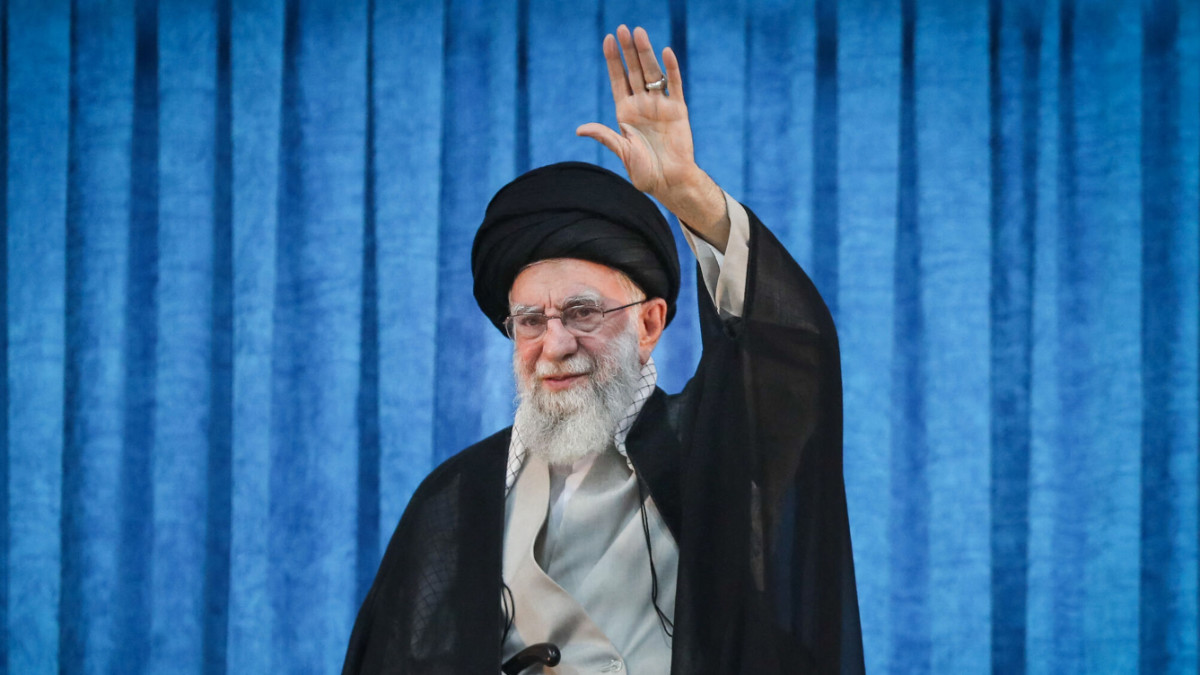Posturing or potential strikes Iran tensions ramp up ahead of nuclear talks

US President Donald Trump said on Thursday that an Israeli strike on Iran "may very well happen”, as he confirmed that the US was evacuating some US officials and their families from the region.
The US is evacuating non-essential US embassy staff and their dependents from the embassy in Baghdad, Iraq.
Other reports said the US was evacuating some staff from embassies in Bahrain and Kuwait, but the embassy in Bahrain denied a change in its posture on Thursday.
Trump on Thursday said the risk of "massive conflict" led the US to draw down staff in the region.
CBS News reported on Thursday that Israel is prepared to launch an attack on Iran's nuclear sites, and that US officials have been discussing how the US could assist Israel without taking a direct role. The report said options could include aerial refuelling or intelligence-sharing.
New MEE newsletter: Jerusalem Dispatch
Sign up to get the latest insights and analysis on Israel-Palestine, alongside Turkey Unpacked and other MEE newsletters
The steady drumbeat of leaks raises questions about whether a strike could take place in the future, or if the Trump administration is trying to put pressure on Iran ahead of a sixth round of nuclear talks scheduled to be held in Oman on Sunday.
A US diplomat at one of the embassies restricting travel said the orders they have received were not out of the ordinary during flare-ups in local tensions.
“These steps don't necessarily mean military action is imminent. Still time for talks, it takes time to move people out. But these are steps that it would make sense to take as part of preparations, and to show seriousness. Provides important leverage in nuclear talks,” Danial Shapiro, a former US ambassador to Israel, said on X on Wednesday.
'Might help, could blow it'
Trump himself toys publicly with the idea that the threat of an Israeli strike may help the US’s negotiating position.
"I don't want them going in, because I think it would blow it,” Trump said, referring to Israel, before quickly adding, "Might help it actually, but it also could blow it."
In some ways, the reports that Israel is "poised" to strike Iran are redundant. By Trump’s own admission, Israel has been lobbying him for months to bomb Iran.
One senior US official recently told Middle East Eye on the condition of anonymity that the Trump administration has been impressed by plans Israel shared with it that lay out unilateral strikes against Iran’s nuclear programme without direct American involvement.
The plans were discussed in April and May with CIA director John Ratcliffe, MEE reported.
“The Israelis have pinpointed everything they can take out that supports Iran’s nuclear sites down to the water supply and power generation, etcetera,” the US official told MEE, referring to a process called Target Systems Analysis, by which militaries assess specific nodes to attack that support a bigger main target.
Israel has also discussed combining cyberattacks and precision military strikes.
Iran’s nuclear facilities are buried deep in fortified bunkers in the Natanz desert and inside a mountain called Fordow.
Analysts say Netanyahu has refrained from attacking Iran in defiance of Trump because he wants to share political responsibility if the strikes go wrong and preserve an American backstop in the likely case of Iranian retaliation.
On Thursday, Axios reported that Trump’s envoy, Steve Witkoff, told some Republican Senators that the administration fears Iran could retaliate against an Israeli strike with ballistic missiles, causing a “mass casualty event".
The article did not mention that Israel is widely understood to have its own arsenal of nuclear weapons.
The Iranians have kept pace with Trump and upped their own rhetoric.
During past flare-ups, Iranian officials have sent signals that they could shut down the Strait of Hormuz in the Gulf, where 30 percent of the world’s oil transits, and have leaked that they could bomb US bases in Gulf states if attacked.
Iran has now clearly stated that threat.
"All its [the United States] bases are within our reach, we have access to them, and without hesitation we will target all of them in the host countries," Defence Minister Aziz Nasirzadeh said on Wednesday. "God willing, things won't reach that point, and the talks will succeed," the minister added.
Israel and Iran had two unprecedented exchanges of fire in October and April 2024.
The US came to Israel’s defence, shooting down missiles and drones in an attack Iran had carefully telegraphed beforehand.
IAEA tensions
Ahead of the talks on Sunday, tensions have also been rising with the UN's International Atomic Energy Agency (IAEA).
Diplomats said the IAEA's board of governors adopted a resolution condemning Iran's "non-compliance" with its nuclear obligations under the Non-Proliferation Treaty (NPT). The resolution was carried by 19 votes in favour out of 35.
The resolution could lay the groundwork for European countries to invoke a "snapback" mechanism, which expires in October. This mechanism would reinstate UN sanctions eased under a 2015 nuclear deal negotiated by then-US president Barack Obama.
Iran's nuclear chief, Mohammad Eslami, said the resolution was "extremist" and blamed Israeli influence. In response to the resolution, he said Iran would launch a new enrichment centre in a secure location.
The issue of whether Iran will be able to enrich uranium on its territory has become the main roadblock to nuclear talks with the US. Trump has insisted Iran will not be allowed to enrich any uranium.
middleeasteye.net